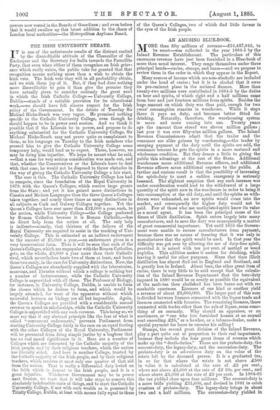THE IRISH UNIVERSITY DEBATE.
IT is one of the unfortunate results of the distrust excited by the discreditable attitude of the Chancellor of the Exchequer and the Secretary for India towards the Parnellite Party, that even when either of them recognises an Irish griev- ance which really exists, the public take for granted that that recognition means nothing more than a wish to obtain the Irish vote. The Irish vote they will in all probability obtain, and we wish them joy of it. But, if they had done nothing more discreditable to gain it than give the promise they have actually given to consider seriously the great need in which the Irish Catholic College — University College, Dublin—stands of a suitable provision for its educational work,—we should have felt sincere respect for the Irish policy of the Government. In the debate of Tuesday Sir Michael Hicks-Beach was very vague. He promised nothing specific to the Catholic University College, even though he should happen to be in power next session. And we think it possible that if the Liberals be in power, and propose to do anything substantial for the Catholic University College, Sir Michael Hicks-Beach may not prove quite as complaisant to them, as his language on Tuesday to the Irish members who pressed him to give the Catholic University College some temporary help, would lead us to expect. There, however, we may be doing him injustice. We hope he meant what he said, —that a case for very serious consideration was made out, and that, whether the Conservatives or the Liberals have to deal with that case, he would not be disposed to throw obstacles in the way of giving the Catholic University College a fair start.
The case is this. The Catholic University College has had to compete, since the foundation of the Royal University in 1879, with the Queen's Colleges, which receive large grants from the State ; and yet it has gained more distinctions in Classics and Modern Languages than the three Queen's Colleges taken together, and nearly three times as many distinctions in all subjects as Cork and Galway Colleges together. Yet the Queen's Colleges have cost more than £12,000 a year, each, to the nation, while University College—the College preferred by Roman Catholics because it is Roman Catholic,—has no direct help from the nation at all. The only help is indirect—namely, that thirteen of the fellows of the Royal University are required to assist in the teaching of Uni- versity College. This is estimated as an indirect endowment to the amount of £3,000 a year,—an endowment given in a very inconvenient form. Thus it will be seen that each of the Queen's Colleges, which are unpopular with the Roman Catholics, gets, on the whole, £9,000 a year more than their Catholic rival, which nevertheless beats two of them at least, and beats those two easily, in the race for University distinctions. Now, the Queen's Colleges are abundantly supplied with the laboratories, museums, and libraries without which a college is nothing but a number of lecture-rooms, while the Catholic University College is unprovided with all these. The Professor of Biology, for instance, in University College, Dublin, is unable to form the classes which he desires to form, and which would be largely attended, for want of the apparatus without which successful lectures on biology are all but impossible. Again, the Queen's Colleges are provided with a considerable annual revenue to spend on scholarships, while the Catholic University College is unprovided with any such revenue. This being so, we must say that if any abstract principle like the fear of what is called "concurrent endowment," prevents Parliament from starting University College fairly in the race on an equal footing with the other Colleges of the Royal University, Parliament will be prevented from doing simple justice by a bugbear that has no real moral significance in it. Here are a number of Colleges which are distrusted by the Catholic majority of the Irish people, and by their religious teachers, which the nation has liberally aided. And here is another College, trusted by the Catholic majority of the Irish people, and by their religious teachers, which receives at most only one quarter of that aid from the nation. That is really a differential duty levied on the faith which is dearest to the Irish people, and it is a great injustice. Whichever Government may be in power next Session, we trust that it will take steps to remove this absolutely indefensible state of things, and to start the Catholic University College, if not with such wealth as is possessed by Trinity College, Dublin, at least with means fully equal to those of the Queen's Colleges, two of which find little favour in the eyes of the Irish people.


































 Previous page
Previous page